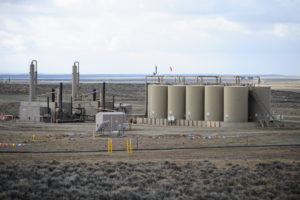By Camille Erickson
Casper Star-Tribune
Via- Wyoming News Exchange

CASPER — In the midst of unprecedented volatility in the global oil market, shale producers in Wyoming received a small boost Friday in the form of tax relief. Gov. Mark Gordon signed into law a bill providing reductions in state mineral taxes amidst certain price environments.
The tax break would kick in if the 12-month rolling average of oil prices falls below $50 per barrel. For natural gas, the 12-month rolling average would need to be less than $2.95 per thousand cubic feet.
In these scenarios, the state’s mineral production tax — know as a severance tax — would be reduced by 2 percent under the new act.
Oil prices have plunged in response to the spread of COVID-19 caused by the coronavirus and a global price war. And several major oil and gas companies have started trimming their workforces or reeling in expenses.
According to a Friday report by the Energy Information Administration, the oil market has never been this volatile, with a glut in supply and a shortage of fuel demand causing “extreme” price fluctuations.
The U.S. Department of Energy initially floated the idea of purchasing 30 million barrels of oil to fill the Strategic Petroleum Reserve and ease the demand drought facing producers. But the stimulus bill passed Friday by the U.S. Congress did not provide such a provision.

However, Randall Luthi, energy policy advisor for the governor, said the idea hasn’t been entirely pitched and could be introduced in financial aid packages down the road.
“House Bill 243 is the least we can do in the worst of times,” Luthi said.
He added lawmakers may have considered extending even more relief to producers, had energy markets taken a turn for the worse earlier, during the Legislature’s session. There are also limits to the bill.
Oil operators will not be able to reap the benefits of the relief until the act goes into effect July 1.
Eligible operators would see 2 percent chipped off their severance tax rate for the first six months of production, and 1 percent for the six months after that.
Ultimately, the relief only applies to a well for one year.
The bill was also meant to be temporary and includes a provision to sunset the relief at the end of 2025.
In the meantime, West Texas Intermediate, the U.S. benchmark, fell to $21 a barrel Friday — an over 65 percent drop from the beginning of this year. The realized price for oil in Wyoming plunged even lower.
“Oil prices have been murdered,” University of Wyoming economist Rob Godby said.
While larger oil and gas companies may be more poised to weather the downturn, midsize operators with debt could be hit the hardest by the brutal price environment. Firms of all sizes have announced drastic plans to slash spending this month.
“At this challenging time for the energy industry in Wyoming, our top priority is the health and safety of our employees and families,” said Ryan McConnaughey, communications director for the Petroleum Association of Wyoming. “Beyond that, as a critical fuel supplier to the nation, we must make sure all aspects of the industry are considered to be essential by federal, state and local governments. Despite recent calls by activist groups to shut down all state activity, critical work must continue to provide reliable, abundant energy that heats and lights our homes, and keeps as many Wyoming people working as possible in these challenging times.”
The downturn in oil also has sweeping implications for the state’s budget, which continues to heavily rely on revenue from minerals.
State economists had anticipated a loss in revenue from natural gas and coal. But the state had forecast rosier conditions for oil, even considering it a commodity to lean on as the state diversified its economy.
“This (current price of oil) is going to hammer the one revenue stream from minerals that the state has become more dependent on because of the ongoing declines in coal and gas,” Godby, the economist, said. “Obviously, oil is now potentially the worst of the three legs because of its price.”
Critics of House Bill 243 considered the cuts in severance taxes just another loss of revenue for the state at a time when revenue streams are drying up.
But Luthi said he hopes the bill could incentivize operators to drill in Wyoming. Relaxing severance taxes for operators could make the state a more attractive place to stay and continue drilling when the economy mends, he said.






